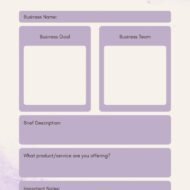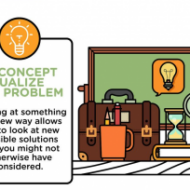Posted by Managementguru in Business Management, Financial Management, How To, Startups
on Sep 25th, 2015 | 0 comments

When you write your business plan, start with the basics, and write the things that you have already thought about. The name of your business, your goals, your team and the products/services you propose to offer. This gives a clean headstart to further evolve your business plan. A business plan should mainly focus on the future fund flow that will pique the interest of the bankers you are trying to pitch for a loan or investors whom you want to genuinely impress. Here are a few Business Plan Starter Questions 1. What is your mission statement? Your mission statement is what you want to do now, and your vision statement is what you want to do in the future. 2. What are your top keys to success? Don’t write a laundry list of keys, keep it simple, and focused. 3. What is your value proposition? Why should someone do business with you? 4. What are your core competencies or skills? 5. What is your start up budget? Write it like a grocery list, at first, and add up the numbers. 6. The executive summary is written last; after the entire business plan is, absolutely, finished. Think of the executive summary as your movie trailer, build to attract interest in your business. Writing a business plan is a huge undertaking, and if you have never done it before, it is down-right scary. Planning to start a small business? Think no more.. You’ve hit the right spot and we have compiled all that is necessary to win over the challenges of a new startup. This guide will serve as a jump start for your new venture and make it exciting. The web has loads of sample plans, but how do you, really, write your own business plan, your own way? How do you write the plan that accomplishes the goals that you want to accomplish in your business? This Business Planner will make your process simple and hassle free! How to Start a Small Business at Home – Read on to find out the Benefits and Advantages of a Home-Based Business Ask Yourself the Right Questions First things first, you have to start thinking about what you’re not thinking about. Ask yourself the right questions, about your business and put it into your plan notes. The best way to write a business plan is to write it in small segments or pieces. Forget trying to consume, writing the entire plan as a large, mammoth, assignment. It is, too, overwhelming, give yourself a break, and write small bursts, of information. It is easier, to write your top three to five business objectives, clearly and concisely when you are not looking down the barrel of a twenty-thirty page business plan....

Posted by Managementguru in Business Ethics, CSR, Marketing, Strategy
on Jan 9th, 2015 | 0 comments

Strategic Change-Beyond the Boxes The major focus of corporate strategy is to formulate a method by which any business can adapt to a changing environment enabling to improve its competitive advantage. The corporate strategy theory presents us with the following questions: Where are we now? Where do we want to be? How do we get there? Corporate Self-Analysis The logic is to examine the current status of the business. Areas that come under this self-analysis purview include: Is the business aware of who its stake-holders are? If you are not going to engage your customers or users, then your business becomes product-centric and not cutomer-centric. What are the long-term objectives of your concern? Without a definitive vision how will you ever design and achieve your short-term goals! Does your company have a mission statement? See the mission statement of Mc.Donalds – McDonald’s brand mission is to be our customers’ favorite place and way to eat and drink. Our worldwide operations are aligned around a global strategy called the Plan to Win, which center on an exceptional customer experience – People, Products, Place, Price and Promotion. What are your present business strategies? If your company’s presence is not felt in the market (forget being a market leader always, though that would be the dream spot of all big corporate companies), or your product is not selling by itself, then there has some serious thinking to be done about your present strategies. Focus on what went wrong, try to get inspired by your competitors’ moves (Ha! Its not copying my friend! ), gear up your advertising department to reach the audience. Also try to find out if there are any black sheep in your stay leaking confidential statistics and strategic business moves. Are they simple to understand and communicate to the workforce? If you are not able to pitch your idea to your workforce in a matter of just 15 minutes, then it is very well clear that you are not clear about what you’ve conceptualized. What is the marketplace scenario? Is it in the growth/decline phase? Sometimes it is better to start a business at bad times. Hiring will be easy, cost will be under control and you can experiment boldly because you have nothing to lose. Who might be your biggest competitors? This takes serious effort and planning and ask your core team to do their home-work properly. “Understand that a competitor is created because you are weak”. Review your business internally, look at your business-does it support growth and adaptability to change? This depends upon the leader who serves as the biggest inspiration for people down the line. The culture he has developed plays a big role in deciding this aspect wherein flexibility and employee engagement are part and parcel of it. How effective are your production processes? How well do sales/personnel/marketing/finance sections perform? How well does the business control its internal resources? This is a separate entity and the most crucial element of an enterprise. Expansion in accordance with the demand on one side and keeping up with the technology advance on the other side and what about the third side – the “WORKFORCE” in caps! Tending to the employee morale is the biggest challenge of modern times. HR MANAGERS have to have up-to-date knowledge on the labor laws and government policies on the security aspects of employees. A small case study on the Fast Food Giant McDonalds: U.S. CMO Deborah Wahl, who joined the fast food giant McDonalds company in early 2014, said in a video about the brand refresh that the company will move from a philosophy of “billions served” —...




